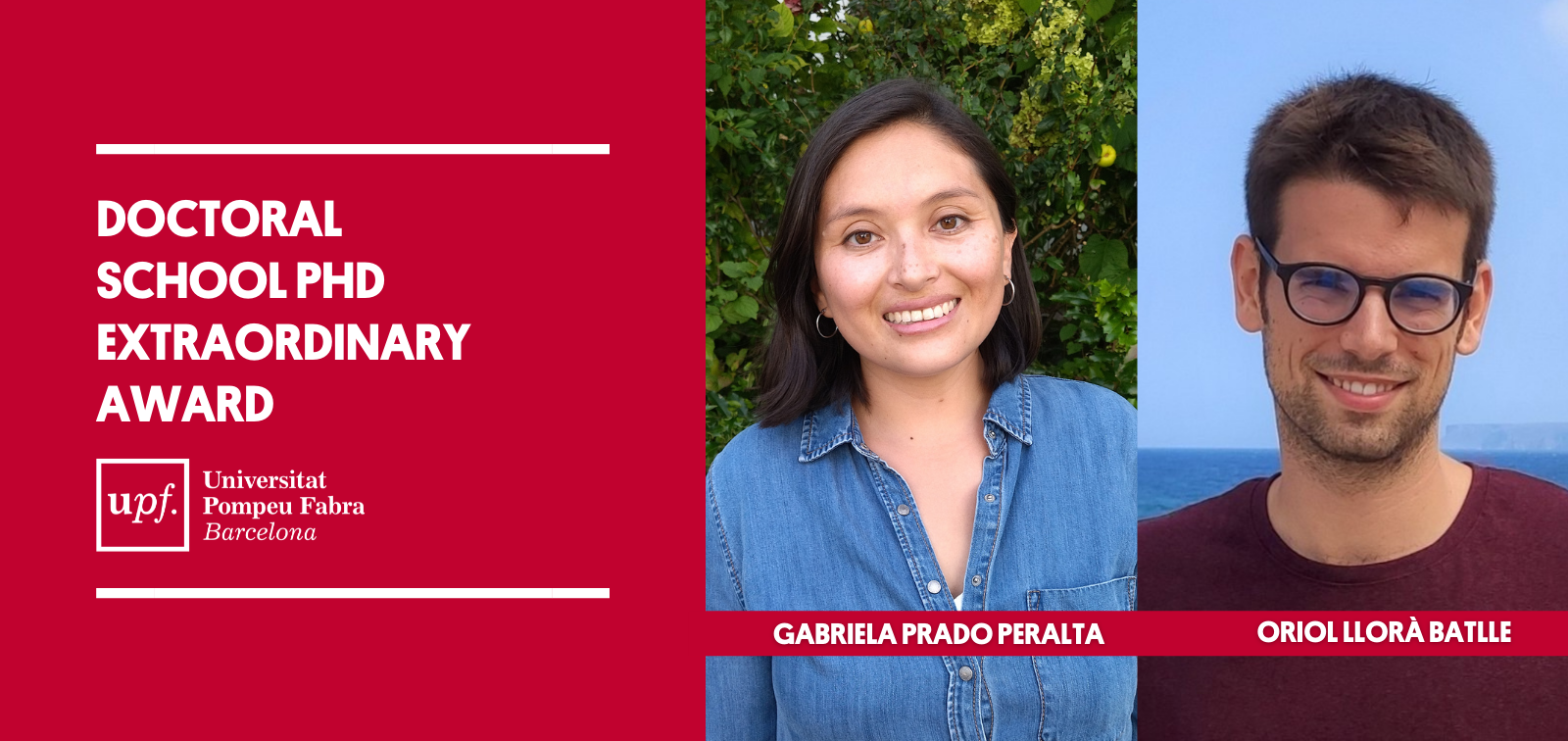Oriol Llorà and Gabriela Prado Receive PhD Special Awards from Universitat Pompeu Fabra
The two researchers were recognised for their theses in the fields of malaria epigenetics and lung function
30.09.2021
Gabriela Prado Peralta and Oriol Llorà Batlle, who defended their doctoral theses in the PhD programme in Biomedicine at the Universitat Pompeu Fabra (UPF), have received the university’s PhD Special Awards for the 2019-2020 academic year. Both researchers did their doctoral research at the Barcelona Institute for Global Health (ISGlobal).
Oriol Llorà Batlle, who is currently a researcher at the University of Cambridge’s Gurdon Institute, did his doctoral thesis on the "Characterization of sexual commitment and the early steps of sexual development in the human malaria parasite Plasmodium falciparum”.
Malaria is a disease that affects 200 million people and causes some 445,000 deaths worldwide every year. The mortality is mainly due to infection with Plasmodium falciparum, the parasite that causes the most severe form of the disease in humans. Humans contract malaria through the bite of an infected female Anopheles mosquito. Once inside their human host, the parasites establish a repeating 48-hour cycle of asexual growth inside red blood cells. In each cycle, a small proportion of the parasites differentiate into male or female gamete precursors called gametocytes. These gametocytes are the only stage in the cycle that can infect a new mosquito vector, making them a key target for strategies seeking to prevent ongoing transmission of malaria and disease eradication.
Llorà Batlle’s thesis, supervised by ISGlobal researcherAlfred Cortés Closas, identified a new route of sexual differentiation that challenges the current text book view of the transmission of the parasite, highlighting its plasticity during this key stage in the parasite’s life cycle. Using a novel combination of conditional recombinases and CRISPR/Cas9 technology, the team also created a tool capable of controlling the parasite’s sexual differentiation. This allowed them to obtain large quantities of gametocytes to facilitate the study of sexual differentiation, potentially contributing to the development of transmission-blocking strategies.
“I am very pleased to receive this award because it recognises all the work done, not only by me but also by the whole group at ISGlobal and our collaborators” explains Llorà Batlle. “And it is my hope that our contribution will further the development of new strategies for the prevention of malaria.”
Gabriela Prado Peralta, who is currently working in the Epidemiology Department of the University of Zurich, studied the effects of body weight and body composition on lung function in her thesis “ Understanding the role of body weight and composition on lung function growth and decline ”. The study was part of the project Ageing Lungs in European Cohorts (ALEC).
In her thesis, which was supervised by Judith Garcia-Aymerich, the head of ISGlobal’s Non-Communicable Diseases and Environment Programme, Prado Peralta sought to overcome some of the limitations of previous research, which had been based on body mass index, a measure that does not distinguish between the contrasting effects on lung function of lean body mass and fat body mass. Her findings confirmed the deleterious effect of obesity on lung function over the life span of the individual.
The results of this study also showed, for the first time, that body composition trajectories from childhood to adolescence are associated with lung function growth and that lean body mass and fat body mass have opposite effects on lung function during this period: a higher percentage of lean mass during childhood and adolescence is associated with better lung function in adolescence, whereas a higher percentage of fat mass is associated with poorer lung function.
These findings highlight the importance of assessing body composition when studying the effects of body weight on respiratory health and suggests that public health policies and clinical interventions aimed at reducing respiratory morbidity should target body composition in addition to body weight.
Another key aspect of this work was that it showed that the effects of body weight on lung function are reversible in both early childhood and adulthood.
“I really am very proud to receive this award”, Prado Peralta explains. “It is an important recognition of my work and it also highlights the contribution of my thesis to the field of respiratory epidemiology.”
During the 2019-2020 academic year, 94 doctoral theses were read in the PhD Programme in Biomedicine at the UPF and 10 were distinguished by a Special Award.
Other ISGlobal researchers whose doctoral theses have received Special Awards in past years include Cyntia Manzano (UPF), Natalie Mueller (UPF) and Elisa López (UB).
Publications related to the theses:
-
Peralta, Gabriela P et al. Childhood Body Composition Trajectories and Adolescent Lung Function. Findings from the ALSPAC study. American journal of respiratory and critical care medicine vol. 200,1 (2019): 75-83. doi:10.1164/rccm.201806-1168OC
- Peralta, Gabriela P et al. Body mass index and weight change are associated with adult lung function trajectories: the prospective ECRHS study. Thorax 2020;75:313-320. doi: 10.1136/thoraxjnl-2019-213880
- Peralta GP, Abellan A, Montazeri P, Basterrechea M, Esplugues A, González S, Roda C, Santa Marina L, Sunyer J, Vrijheid M, Casas M, Garcia-Aymerich J. Early childhood growth is associated with lung function at seven years: a prospective population-based study. European Respiratory Journal, 56:2000157, 2020. doi: 10.1183/13993003.00157-2020
- Bancells, C, Llorà-Batlle O., Poran A, Nötzel C, Rovira-Graells N, Elemento O, Kafsack BFC and Cortés, A. Revisiting the initial steps of sexual development in the malaria parasite Plasmodium falciparum. Nature Microbiology, 4:144-154, 2019. doi: 10.1038/s41564-018-0291-7
- Llorà-Batlle O, Michel-Todó L, Witmer K, Toda H, Fernández-Becerra C, Baum J and Cortés A. Conditional expression of PfAP2-G for controlled massive sexual conversion in Plasmodium falciparum. Science Advances , 6:eaaz5057, 2020. doi: 10.1126/sciadv.aaz5057



